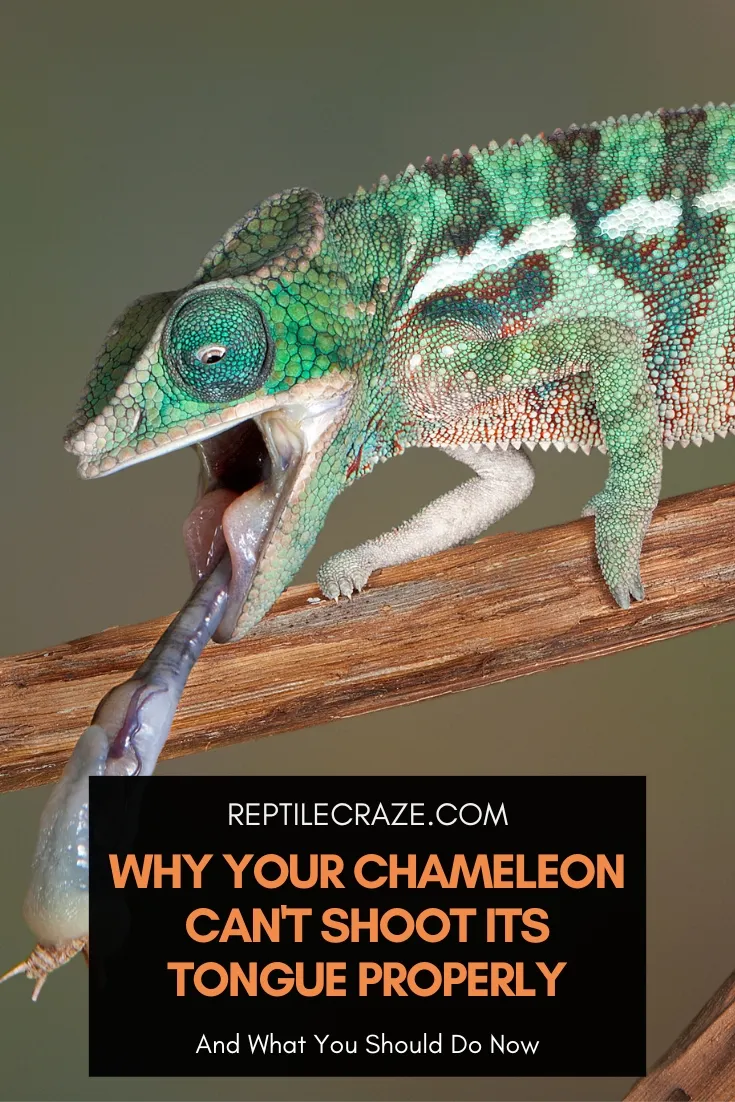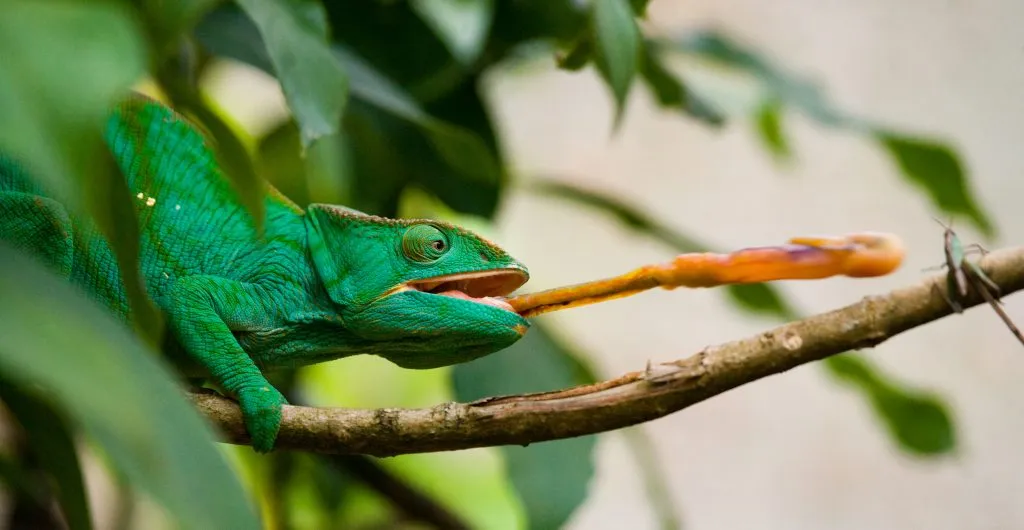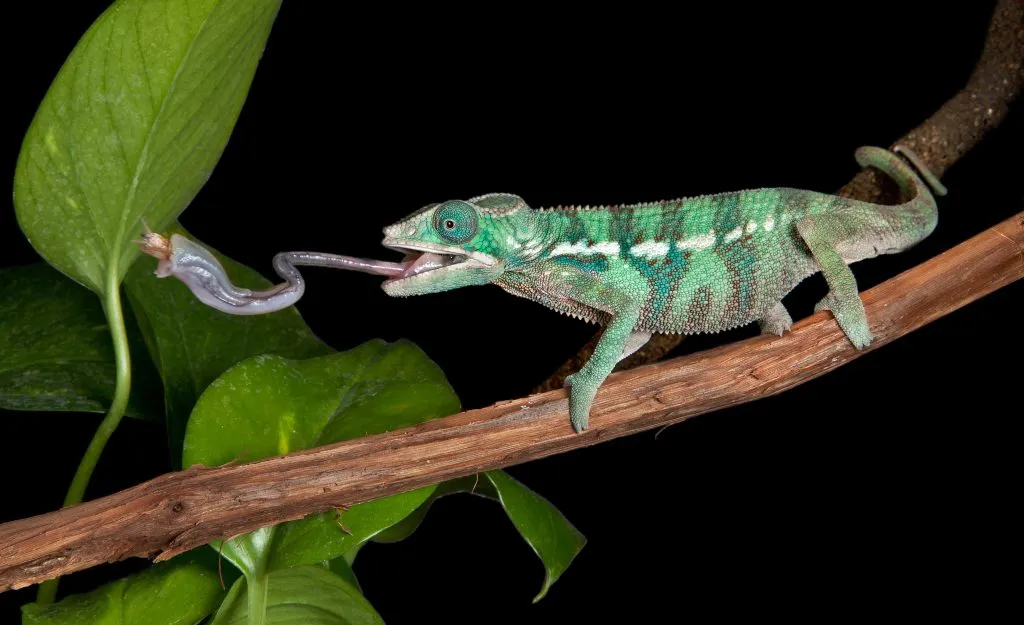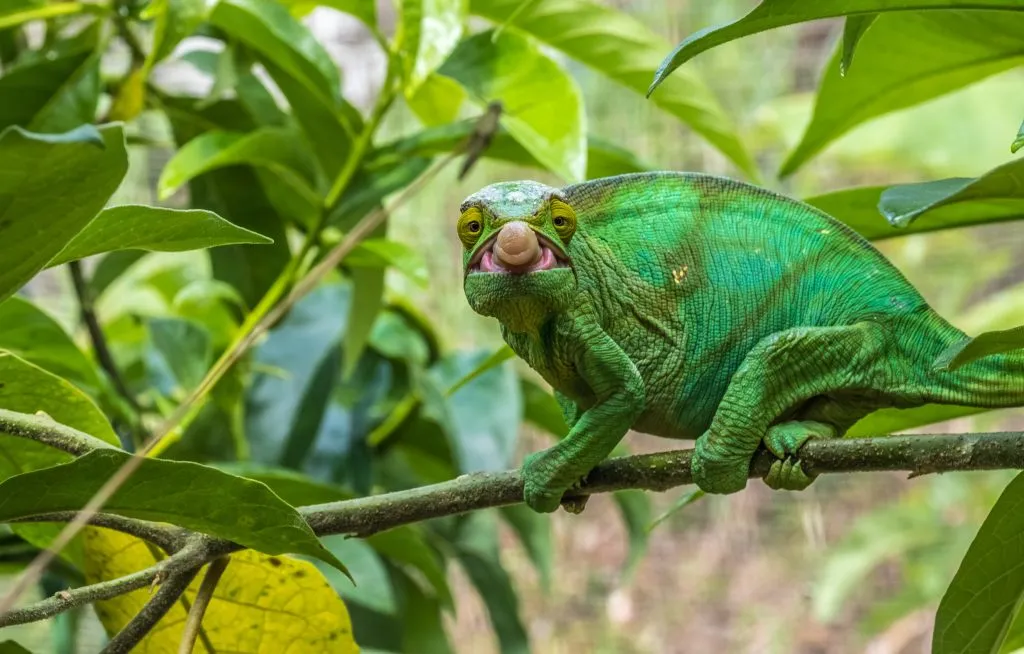
Aside from color-blending, chameleons survive in the wild with the help of their long, sticky tongues. They are even known to shoot their prehensile tongues at lightning-fast speeds. If your chameleon’s tongue is not working properly, you should act immediately.
A chameleon not shooting its tongue properly can be caused by metabolic bone disease. Dehydration, tongue injury, or oral cavity infections can also cause this problem. Otherwise, old age, lazy tongue, or inappetence are likely culprits.
In this article, we explain what causes your chameleon to not shoot its tongue properly, how to address those problems, and when you should take it to a herp vet.
Why Your Chameleon Can’t Shoot Its Tongue Properly

1. Aging Chameleon
On average, chameleons have a life expectancy of 2–7 years in captivity. But, depending on the species and how well you take care of them, some may reach up to 12–25 years.
Certain changes happen when they start to age. Aside from a lower appetite, their tongue-shooting efficiency to catch prey is also affected.
Overall, younger chameleons use their tongues more efficiently for catching bugs. But as they get older, the muscles surrounding the tongue bone may not be as elastic as before.
Coupled with poorer vision, they might not be able to properly aim and fully extend their tongues.
As long as they are eating and aren’t losing weight, continue monitoring your chameleon. Keep observing the best practices for feeding and supplementation, so your lizard pal is in optimal health.
2. Lazy Tongue
In the wild, chameleons need to know how to hunt with their tongues. Even as hatchlings, these reptiles can eat the same kinds of
But, when chameleons are born and raised in captivity, they may not have the same amount of tongue-shooting practice. This is true if their owners constantly hand-feed them.
Even if they’re gifted with the strongest and fastest tongues, they will learn they won’t need them to eat. They will just wait for their owners to bring the
Eventually, their tongue muscles grow weaker. They won’t be able to shoot their tongues properly, let alone extend them.
3. Dehydration
Water is an essential part of ensuring a chameleon stays healthy and happy. If you fail to meet its hydration requirements, it can lead to various problems. This includes your chameleon not being able to shoot its tongue properly.
Too-low humidity levels and high
If you can’t get your chameleon to drink water, it soon won’t have enough energy to use its muscles, tongue included.
Mild dehydration cases can be safely treated at home. But, if you’re unsure how to rehydrate your chameleon or the dehydration has become severe, take it to the vet at once.
Tip: Learn about the symptoms, causes, and treatment of dehydration in chameleons from our article here.
4. Chameleon Doesn’t Want to Eat

Appetite issues for your chameleon can also affect proper tongue usage. It may be simply because it’s too full to eat another gulp of delicious insects.
But if your chameleon won’t eat anything for more than 3 days, it would be better to investigate. As chameleons are highly sensitive to changes in their environment, check if anything in their
A chameleon that does not want to eat may also be experiencing nutritional deficiencies. Coupled with a misguided tongue aim and decreasing projectile length, these are some signs that you should seek a herp vet’s help.
Tip: Check out the infographic in this article to help you determine the potential reason for your chameleon not eating.
5. Tongue Injury or Trauma
It’s not uncommon for chameleons to injure their tongues while “hunting” their prey. Even if we try to keep their enclosures safe, they can get their tongues caught on something.
Chameleons can also get their tongues injured during feeding in these scenarios:
- Entangle tongues with another chameleon eyeing the same insect
- Live prey damage the chameleon’s tongue
- The feeder accidentally pulls on the chameleon’s tongue during hand-feeding
- Sharp insect parts become lodged in the chameleon’s tongue or mouth.
Another less common reason that could lead to tongue injuries in chameleons is a fall. Though various reasons can cause your chameleon to fall, one that damages its jawbone can cause problems with its tongue, too.
Hence, take your chameleon to the vet immediately so the extent of damage can be assessed.
Also read: 6 Reasons Why Your Chameleon Is Shaking
6. Infection of the Mouth and Oral Cavity

One of the most common infections in chameleons is stomatitis, aka mouth rot. Mouth rot is a serious infection of the chameleon’s mouth and throat.
Some of the common causes of mouth rot in chameleons are listed below.
Stress | • Chameleons normally have controlled quantities of bacteria in their mouths • When a chameleon’s immune system is weakened, it won’t be able to keep the bacterial count in check • Can also be attributed to poor husbandry conditions and a lack of UVB light |
Oral trauma or injuries | • Cuts or tears in a chameleon’s mouth provide the perfect entry point for bacteria • With the presence of stuck particles (parts of live prey, foreign objects, or chewed bedding material), the infection can progress to ulcerative stomatitis |
Poor husbandry conditions | • Incorrect • Chameleons can then ingest the bacteria by drinking from unclean water sources |
Typically, healthy chameleons can fight off infections on their own. But, as they’re good at hiding illnesses, you might spot the infection at later stages already.
Early symptoms of mouth rot can include gum swelling, yellow or white discharge from the mouth, and feeding behavior changes.
The infection can then spread and cause swelling and even ulcers on the lips, gums, palate, and tongue if not treated immediately.
No matter how minor a cut your chameleon has, consult with a herpetologist first. For mild cases, topical antibacterial or antifungal ointments may suffice.
But for the more severe ones, more potent antibiotics or surgery may be needed to remove any dead tissues.
7. Metabolic Bone Disease (MBD)
Metabolic Bone Disease is characterized by deficiencies in calcium and vitamin D. This commonly affects reptiles, particularly veiled chameleons.
Calcium, together with phosphorus, is important for strong bones and good muscle contractions. If chameleons aren’t exposed regularly to UVB light, they can’t properly absorb calcium.
They will then compensate by drawing stored calcium from their bones, making them frail.

Your chameleon’s tongue consists of muscles attached to its jaw and the tongue bone.
If its jaw becomes soft and the tongue muscles grow weaker, it can’t shoot its tongue properly. The tongue can even become paralyzed in more severe cases.
Other signs and symptoms of MBD in chameleons include:
- Frequent grabbing of the head and legs
- Inability to climb and frequent falling
- Lack of coordination
- Swollen and curved limbs
- Curved spines
Treatment and prevention of MBD include feeding chameleons with varied and gut-loaded insects. Calcium dusting their meals can also be done to ensure they’re getting this mineral in the right amounts.
If you combine proper nutrition with 12 hours of UVB light exposure, your chameleon will be healthier than it ever was.
Tip: As chameleons are diurnal reptiles, follow this suggested lighting schedule.
When Should I Take My Chameleon to a Herp Vet?
Your chameleon not being able to shoot its tongue properly can be alarming for first-time reptile parents.
Apart from aging, you can solve or even prevent most of those causes by
- Maintaining proper humidity and temperature settings
- Following a proper feeding schedule
- Following misting schedules
- Regular supplementation.
But if this has happened for a prolonged period already or you suspect an injury or infection, take it to an exotic animal vet or a herp vet.
They’ll examine the extent of the damage so a specific treatment plan can be made. In the worst-case scenario, they may suggest tongue amputation if there’s a severe infection or the injury is beyond repair.
- Enchi Ball Python: A Unique and Stunning Morph of Python regius - March 27, 2025
- Emerald Tree Monitor: The Enigmatic Green Guardian of the Rainforest - March 26, 2025
- The Egyptian Cobra (Naja haje): A Fascinating Serpent - March 25, 2025
